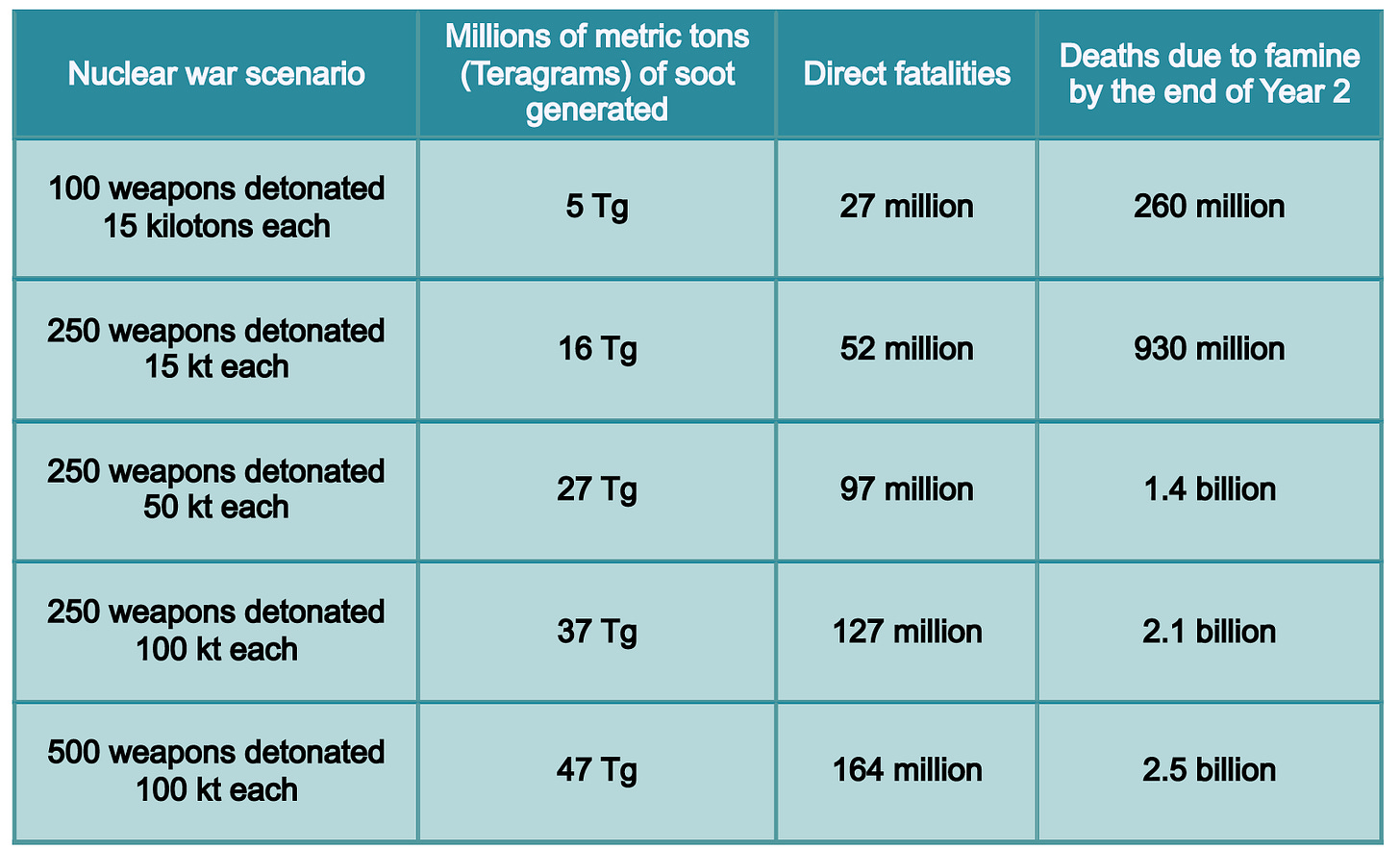Crunching the Numbers on Catastrophe
The latest science on what follows even a 'small' nuclear war is breathtaking
I’m excited to share this! International Physicians for the Prevention of Nuclear War has finally published my report reviewing the latest science on what follows after even a localized, smaller nuclear war. The full report can be accessed as a PDF here. Below is an excerpt from the opening.
It’s long been known a major nuclear war could destroy modern civilization and kill most of humanity.
But what about a “minor” nuclear war — a conflict confined to one region, say, or involving just a small fraction of the world’s arsenals?
According to the latest scientific studies reviewed in this report, a “minor” or “regional” nuclear war would also be a planetary-scale event. In fact, it would be more dangerous than we understood even several years ago.
A war that detonated less than 1/20th of the world’s nuclear weapons would still crash the climate, the global food supply chains, and likely public order. Famines and unrest would kill hundreds of millions, perhaps even billions.
“In a nuclear war, bombs targeted on cities and industrial areas would start firestorms, injecting large amounts of soot into the upper atmosphere, which would spread globally and rapidly cool the planet,” according to a landmark study published in August 2022 by Nature Food.
Lili Xia of Rutgers University led an international team of scientists who looked at how much Sun-blocking soot would be generated by cities incinerated under various scenarios of a regional nuclear war between India and Pakistan. They considered how far global temperatures would fall as a result; what would happen to crop production; and finally, how many people would starve to death. Their findings: As horrific as the war zone itself might be, with tens of millions of direct, immediate fatalities, that initial death toll would be dwarfed in coming months and years by starvation deaths all around the world.
In fact, they found, more than 2 billion people could die of starvation after an India-Pakistan war.
“Famine could result for a third of Earth,” the authors write, “even from a war between India and Pakistan using less than 3% of the global nuclear arsenal.”
Table 1 below is adapted from Xia et al. (2022). The five scenarios listed are plausibly in-line with the region’s nuclear arsenals (which continue to grow):
The researchers used a 2010 population dataset that assumed a total world population of 6.7 billion people. (Total world population estimates today are about 8 billion people). The calculated death tolls of up to 2.6 billion people indicate that a nuclear war between India and Pakistan could kill up to every 3rd human.
Again, every one of those scenarios takes as a starting assumption that 97% of all the world’s nuclear weapons will not be used.
The scenarios considered involved a hypothetical nuclear conflict between India and Pakistan — two nations who have fought recent wars, continue to have border skirmishes, and deploy nuclear weapons prominently in their military planning. But the authors of the Nature Food study note that it does not necessarily matter where such a war happens. Whether cities and industrial areas are incinerated in the Middle East, on the Indian subcontinent, or in Central Europe, the soot rises into the same sky.



I'm afraid that some of the "planners" for nuclear war don't believe that it would involve nearly 100 strikes.
They think just one or two would "shock and awe" everyone into compliance. Their model is based in WWII.
They don't see it as automatically escalating. Rather they see it like a game of strategy between a small handful of people (men) in one or two countries and that it all comes down to which side is smartest or bravest etc. And of course they assume they are the ones.
"War Day" by Whitley Strieber and James Kunetka (1984) describes the aftermath of a limited exchange of a handful of nukes between USA and USSR. I read it in high school back when we all sorta assumed the missles would fall from the sky any day. It's pretty grim.
I'd like to see the predictions for the more limited scenario. Show that to decision-makers. "Even assuming it goes just like you see it in your mind, it will still not be worth it."
The world owes you gratitude for doing this work.